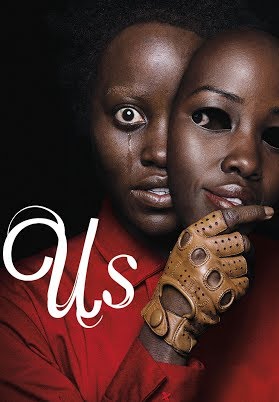As human nature takes every walking step with capability, it is no shock to learn that our minds themselves derive from a sense of avid complexity, and the secrets of the mind—of the beholder, are stored away into your deepest desires. These hidden gems of potential are revealed with every passing second, and our understanding of how our minds function and the reasons for our actions becomes clearer and more cohesive every day. We may now know some causes and triggers for certain psychological behaviors, however, the secrets of our conscience are still buried deep into the depths of the unknown, and Jordan Peele captures this perfectly in his horror film US. Adelaide Wilson and her family encounter four masked strangers in their vacation home after a trip back to her hometown. Eventually, these masks are revealed, and the characters are shocked to see that these strangers share the same faces, the same mannerisms, and the same deep, dark secrets. This poses a question to ask myself: do we even know ourselves at all? What if we’re just strangers to our true selves?
From the beginning of time, we have seen versions of ourselves that seem out of place, out of nature, and out of scheme for how we perceive ourselves and others around us. The implementation of this literal ‘shadow’ of our own form and of our capability of wrath is physically represented by identical beings of the Wilson family, and by usage of Carl Jung’s “Shadow Theory”. Jung’s psychological reasoning can be formulated on a simple basis: every person has an unknown side to themselves that not even they are aware of. Differing from Jung’s other theories about the Anima, Ego, and Persona, the Shadow is representative of the things we wish not to see, of the things we wish to ignore about ourselves (tales that you don’t want others to know about that keep you up at night). Our Shadow embraces these thoughts that have been buried deep into our unconscious: the sins, dark thoughts, and the moods for which we feel guilt and shame. The only way in which we can individuate ourselves from this looming, dark Shadow of ours is by coming face to face with it and recognizing it for what it really is. If we observe our resentment towards ourselves and others, and if we consider the moral aspects of our behavior, we can then have the opportunity to bring the Shadow into our aware consciousness. By doing this, we can achieve a new sense of self, one of independence, strength, and content.
In a way, Peele’s creative world building and directive skills have subconsciously and brilliantly implemented the stages in which we follow concerning our own personal journey with our Shadow. In the beginning of the film, the Shadows are considered strangers, savages to the circumstances of having no bare consciousness; they are rabid, hungry, and emotionless, just like the figurative elements of our own Shadows by Jung’s Theory. Adelaide and her family spend an awful lot of time trying to escape this figment of themselves, choosing not to recognize what it truly could represent, rather focusing on the shallow and prominent thoughts of getting to safety and security. Throughout the movie, we often see these alter egos performing heinous actions, such as stabbing with scissors and hitting with bats, things that would normally either be done in self defense or at least with some form of remorse. Unsurprisingly, we see no trace of remorse on the faces of the attackers, rather no emotion at all. This could potentially represent the despicableness of our Shadows, the simplicity of the range in which we could go if we do not come face to face with the issue at hand. Eventually, we learn that these identical beings are from a mirrored world, although this one lacks emotion, sympathy, empathy, and all things that make us naturally human. To me, I can see this representing the world in which our own Shadow lives in, that these subconscious wits about ourselves are only subjected to a layer of our consciousness that does not include human emotion or feelings. The only way in which we can get rid of this is by facing our Shadows, just like Adeiade and her family do at the end of the movie.
In conclusion, the phases in which the Wilson family partake in can be replicated in a similar stand point to that of the Jung Theory. The point in time in which we recognize the figments of our own Shadows can be the only thing figuratively that can set us free from the part of ourselves that we’re undoubtedly unaware of. Just like Adelaide’s trial and tribulation throughout the movie, it won’t be easy necessarily to detach ourselves from this Shadow of ours, and off of Jung’s Theory, that could very well be why some amount of corruption still exists in this world today. Jordan Peele and his horror film have opened up a new world of possibilities in which we can physically see a representation of what certain psychological elements can do to you, and why it is so important that we continue to research these issues in the future.
